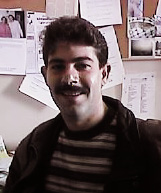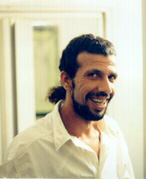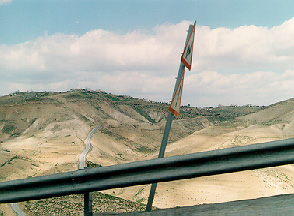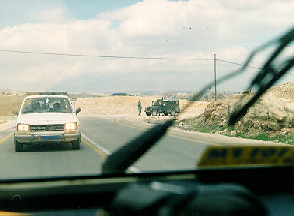7 March 1997
"Off to the mountain"

Saleem's Second Coming
Saleem Daoud (pictured left), one of the two Birzeit students you may remember that took some of the photos for the "On the Ground in Ramallah" website (http://www.birzeit.edu/palnews/war) during the clashes at the end of September 1996, came round this morning at 10:00am. I was in the bath. The other student photographer from the September clashes - Kifah - who has moved in to my house since those dark days, was still clawing his way out of sleep after answering the door.
"Yellah! ("Hurry up!") We're going to Jebal Abu Ghnaim," said Saleem, banging on the bathroom door.
I had been counting on a quiet day working on a book chapter about academic freedom and - more imminently - breakfast, but the idea was tempting. Jebal Abu Ghnaim ("Ghnaim's Father's Mountain") is the latest point of conflict between the Israelis and Palestinians.
Located slap bang in the middle of Palestinian East Jerusalem, the Israeli Likud government wants to make Abu Ghnaim yet another Jewish settlement. There have been several demonstrations already, the latest scheduled for today, one Palestinian killed, and the guarantee of escalation in this latest Israeli one-liner in the stand-up comedy of Netanyahu's "peace process". I guessed I had better go see it.

"How long are you going to be?" said Saleem.
"20 minutes," I replied. I knew that Saleem's doodeh ("worm", part of the Arabic phase for someone who is hyperactive) was unlikely to react well to this news.
"20 minutes?!!" he shouts and begins to curse me in a vile manner. I can hear Kifah start laughing in the kitchen. The pathway of the search for reality is never smooth.
I finally got out the bath and exited the bathroom, dripping, to see Kifah (pictured right) plugged into his first cigarette of the day.
"Where's Saleem, Kifah?" I asked.
"Outside," he replied. Saleem's car horn was about to get some exercise. I rolled my eyes. A suitable beginning to the day.
Alternative route around Jerusalem
Finally en route, We took a left halfway to Jerusalem, onto the only route Palestinians can take to the southern part of the West Bank, thanks to the Israeli closure of Jerusalem. This is for Kifah's benefit, as he has a West Bank ID card.
When I visited Gaza last week, my friend Eyad's 19-year-old Gazan wife surprised me when she told me that she had never seen Jerusalem in her life. Outrage overcomes you when you realise that a perfectly normal and friendly person sitting in front of you cannot travel to Jerusalem simply because of their race.
This incident shocked me, even though I have lived here for two-and-a-half years and work on these very issues. It is so easy to forget that crucial factor of the daily human cost of occupation. How? Because it's been made such a part of normal Palestinian life.
When Israeli spokesmen claim to be protecting the rights of the various ethnic and religious groups in Jerusalem, as they often do, it always strikes me as odd that Israel's banning of all 2.5 million Palestinians from going there (bar a few thousand Palestinian manual labourers for them), doesn't elicit more of a reaction from interviewers.
"Our security," is a powerful argument until you consider that suicide bombers are not known for their tendency to apply for permits. The result: the people caught 'illegally' inside Jerusalem are the normal people, who want to visit family, libraries, religious sites, shops, or just go for a meal or beer.

Al-Wadi An-Nar ("The Valley of Fire")
The coming talks about the so-called "final status" of Jerusalem have already been prejudiced by Israel's activities in the city since 1967 and during the current status, where no side is supposed to change the status of anything in the city.
Even if the status quo was being maintained, for years, Jerusalem's Palestinians have been refused building permits inside the municipal boundaries, forcing them to move into a suburb called Al-Ram, which Israel, through some creative gerrymandering does not consider to be part of Jerusalem. As a result we are in a situation where today many of these Palestinians are having their Jerusalem ID cards confiscated because they have moved "out" of the city.
This renders them liable to the Israeli permit system, in common with all West Bank Palestinians. For every Palestinian's Jerusalem ID card that is confiscated there is an "increase" in "the Jewish presence in the city". Needless to say, the Jewish settlers living in the West Bank do not need permits to visit Jerusalem, one manifestation of our local version of apartheid. West Bank and Gazan Palestinians have thus been cut off from the city completely, since the Jerusalem checkpoints were established in early 1993. The phrase, "facts on the ground", often used here to describe Israel's, is self-explanatory in the face of examples such as this.
We passed some of those facts on the ground - the myriad existing Jewish settlements in Palestinian East Jerusalem - on the road to Beit Sahour and Bethlehem nearby to Jebal Abu Ghnaim. This road turns into another road before getting to the two Palestinian towns, winding up and down mountains with at least 15 consecutive hairpin bends at the craziest angles.
The Palestinians call this road (pictured above right from halfway up) Wadi An-Nar ("The Valley of Fire") and it increases the trip from Hebron to Ramallah by an hour-and-a-half on a good day, as well as putting the accident rate well up. Needless to say, Israelis don't need to travel on this road, not that this makes any difference to their own soaring accident rate. The number of Israelis killed in road accidents in 1996 was about half of the number of Israelis killed in terrorist attacks since 1993. Basically, Israelis drive with the same "I can do whatever I want" attitude with which they bomb Lebanon.

Checkpoint
Israeli checkpoints at each junction told us the military authorities were aware of the joint Israeli-Palestinian demonstration at Abu Ghnaim. None of them bothered us. Saleem is a Jerusalem resident, therefore has a yellow-plated car, and they were obviously more interested in stopping buses of demonstrators. We later heard a Palestinian Authority official saying that 23 buses of demonstrators were stopped and sent back to where they came from.
Impromptu as opposed to static checkpoints are the really scarey ones for Palestinians. The second any checkpoint becomes permanent, ways are found around it. But a jeep that suddenly slams on its brakes or is hidden round a bend in the road is something that is much less easy to account for. Those Palestinians that are wanted by the Israeli military authorities, some for political activity from as long as 9 years ago, just have to deal with this constant uncertainty as best they can. Constant uncertainty and insecurity are part of the Palestinian psyche under military occupation and their effects will be felt for generations.
This page is part of the website "A Personal Diary of the Israeli Palestinian Conflict" by Nigel Parry. All photos and text are © Nigel Parry. More information about the diary can be found in the FAQ. Photos can be ordered. Reach Nigel Parry via the contact page. This website has frames to aid navigation. Get back to them here if you surfed into this page directly.